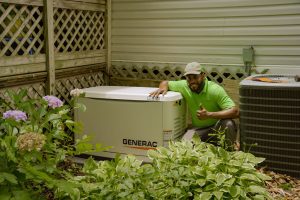Generators are essential for providing power during outages, but like all machines, they can experience issues over time. Knowing when your generator needs repair can prevent small problems from turning into costly disasters. Here’s how to spot the warning signs and ensure you get timely generator repair in Jackson, MS.
1. Frequent Power Fluctuations
If you notice your generator causing lights to flicker or electronic devices to malfunction, it indicates that it’s struggling to provide a steady power supply. Frequent fluctuations can mean an issue with the voltage regulator or fuel system. These fluctuations are not just inconvenient—they could damage your appliances over time.
2. Unusual Noises or Vibrations
Every generator makes noise, but if you start hearing grinding, rattling, or banging, it’s a sign that something isn’t right. Unusual sounds often point to loose components, worn-out parts, or even internal damage. Similarly, excessive vibrations can indicate problems with the engine mounts or alignment. It’s important to address these issues promptly before they cause more severe damage.
3. Difficulty Starting the Generator
A healthy generator should start smoothly. If you find yourself trying multiple times to get it going or if it sputters when starting, there might be an underlying issue. Problems with the fuel system, spark plugs, or battery could be to blame. This is one of the most common signs that your generator needs professional repair.
4. Leaking Fuel or Oil
Fuel or oil leaks are serious concerns that require immediate attention. Leaks can occur due to cracked hoses, loose connections, or damage to the tank. Not only do these leaks reduce the generator’s efficiency, but they can also create hazardous conditions, especially if the fuel comes into contact with hot engine components.
5. Overheating
If your generator is constantly overheating, it’s a red flag that something is wrong. Overheating could be due to clogged air filters, low coolant levels, or a malfunctioning cooling system. Ignoring this problem can lead to severe engine damage, so it’s crucial to address it quickly.
6. Warning Lights or Error Codes
Modern generators come with diagnostic systems that display warning lights or error codes when there’s a problem. If you notice any warnings, consult your owner’s manual to understand what they mean or contact a professional for assistance. Ignoring these alerts can lead to more extensive damage over time.
7. Reduced Power Output
Your generator should provide sufficient power for your needs. If you notice a drop in performance or find that it can no longer handle the load it once did, it’s time for a repair. Reduced power output can result from issues with the alternator, fuel injectors, or electrical connections.
8. Increased Fuel Consumption
If your generator suddenly starts using more fuel than usual, it could indicate a problem with the fuel system, air filters, or engine. An inefficient generator not only costs more to operate but can also be a sign of internal wear or damage.
By staying vigilant and addressing issues early, you can keep your generator running smoothly and ensure it’s ready to provide power whenever you need it.
Schedule service at your earliest convenience with AirSouth Cooling and Heating.








